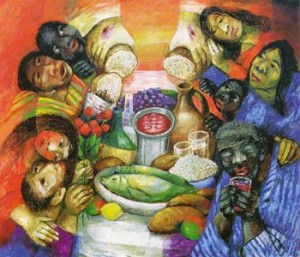During the course of my education in the GST another passion of mine that has emerged is practical theology. My interest in this field is intimately connected to some of my other loves: justice, spiritual formation, community, mission… Pursuing practical theology allows me to take the theories and ideas that emerge within these other passions and ask what they look like in the everyday lives of everyday Christians.
The papers that I’ve linked to below display my beginning thoughts on two issues of practical theology. In “Sharing Food, Sharing Life,” (written for Dr. Cukrowski’s New Testament Ethics class in the spring of 2011), I explore the spiritual significance of food and eating for our identity as the people of God. The “Theological Reflection Paper” posted below was written for Dr. Robert Foster’s Justice in the Biblical Tradition class in the spring of 2010. It is an examination of one of the most deplorable injustices of our day—human trafficking—and the ways James 1:22-2:26 challenges Christians to respond rather than remain in ignorance and apathy.
These papers (rudimentary and faltering as they may be) betray my deep love for issues of practical theology, show at least beginning attempts to analyze and understand and draw connections to contemporary cultural contexts (outcome 4abcd), exhibit ways in which the theologies and traditions of Christianity intersect with these matters (outcome 2abc), and indicate some of my perspective on how the church can and should be equipped in knowledge and in practice to engage in issues like these (outcomes 6abcd, and 8abd).
Although my passion for good, healthy food and constructive eating practices is particularly well known (particularly in the St. Ann Community), my interest in practical theology is by no means limited to the two issues I’ve written about here. I love the idea of continuing in the vein of practical theology well into the future, helping people understand what our actual practices of everyday life—shopping, building, working, driving, exercising, talking, etc.—say about us and what we believe about God and our participation in God’s mission in the world. I’d especially enjoy then helping people shape their practices so that those reflect healthier, more constructive beliefs, therefore impacting the world in increasingly positive ways for the Kingdom. At this level, then, I suppose these papers are also an indication of what I see as an important part of my own ministerial identity (outcome 10bc): serving as one who helps people understand the implications of their beliefs and practices and discern how those do or do not align with the best of the Christian tradition.

Sharing Food, Sharing Life

Theological Reflection Paper








